Science journalism is really about everything, I like telling my science-journalism students, because science is really about everything. Take The Golden Bowl, the insanely prolix novel by Henry James, which I read as penance after zipping through a Stephen King gore-fest.
The Golden Bowl, I’d heard, is a slog compared to thrillers like The Portrait of a Lady and Turn of the Screw, but James called Bowl his “solidest” novel. By that he must have meant the most Jamesian because The Golden Bowl reads like a parody of James. H.G. Wells’ comparison of James to a hippopotamus trying to pick up a pea comes to mind.
Almost nothing happens, and yet nothing is straightforward, certainly not the prose. James jams sentences with subjunctives and conditionals, second and third thoughts, double and triple negatives. Just once, I whined, I wish you’d say what you mean. Plus, the characters are socialites who would never dream of washing their own dishes.
But the book grew on me. Superficially dated, it is actually bracingly modern, or timeless. It dwells on what psychologists call “theory of mind,” our supposedly innate ability to infer each other’s thoughts. James is telling us, in effect: You think you know what’s going on in other peoples’ heads? Think again.
The novel focuses on a love quadrangle. Maggie Verver, whose point of view predominates, is an innocent (at first) American girl. Her beloved dad, Mr. Verver, is a fabulously rich financier and art collector. Charlotte, Maggie’s childhood friend, is poor, but she’s a babe and social ninja. Amerigo is a babe too, a gorgeous, smooth-talking Italian prince who, like Charlotte, lacks moola.
Just once, I whined, I wish you’d say what you mean.
Early on, Maggie marries Amerigo, aka “the Prince,” and Mr. Verver marries Charlotte, so now everyone can live in luxury, happily ever after. Right? Wrong. The problem, the novel’s MacGuffin, is that Charlotte and the Prince once had a thing. They didn’t marry, because they would have been poor; they might have had to wash their own dishes!
These two hotties continue their thing after the Prince marries Maggie and Charlotte marries Maggie’s dad. Are the Prince and Charlotte fooling around? Probably, but James keeps us as well as Maggie and her dad guessing.
And that’s the point. Everyone in the novel is guessing what everyone else is thinking and feeling. Theories of mind, like the clauses in James’ sentences, nest within each other like Russian dolls. Each character has a theory of each other character’s mind, a theory that necessarily includes a theory of that character’s theory of each other character’s theories.
All these theories of mind are necessarily tentative, based on incomplete knowledge. And all the characters keep adjusting their theories of each other as circumstances change or seem to change. Each character’s self-theory is also unstable. Oh, and all the characters, even sweet little Maggie, deceive each other and themselves.
The result is a combinatorial explosion of theories of mind. And that, I think, is James’ purpose, and accomplishment, to represent, with his comically convoluted prose, this combinatorial explosion, which abounds with infinite regresses and loops.
You think the traveling salesman problem is hard? Try figuring out what Maggie, her dad, Charlotte, and the Prince really know about each other. I can see some ambitious digital-humanities scholar trying to solve this riddle with a fancy network diagram updated by a Bayesian algorithm. Good luck.
If I were much smarter, James forces me to accept, and paid much closer attention, I might glimpse the fractal depths underpinning my relations with, say, my girlfriend “Emily.” But I have neither the time nor inclination to figure out what Emily “knows” about what I “know” about what she “knows,” and so on. I have a full-time job, I wash my own dishes.
Also, let’s face it, the message of The Golden Bowl isn’t exactly news: Our inability to understand each other, and ourselves, can have tragic consequences. Yeah, I don’t need James to remind me of that. I just have to look at the headlines in this morning’s New York Times. ![]()
Lead image: slavantonov / Shutterstock
































